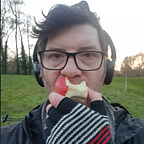I have been actively applying for a place as a funded PhD researcher since gaining my Masters in Research from the University of Exeter in 2016. In that time I worked doing meals on wheels for elderly and vulnerable people in Okehampton (cooking and delivering the meals in a heated van); I got a job in the kitchen of the new IKEA in Exeter, serving the first plate of meatballs there (I have still yet to try them); after 9 months I managed to get out of the kitchen into the plants section, which was a big deal at the time! In 2019, whilst at IKEA, the opportunity came along to train as a geography secondary teacher…. and teaching is what I have been doing for the past five years. Two years of which I had the privilege of teaching humanities at Sands School in Ashburton alongside doing humanities supply in regular schools. I do love teaching — but it is difficult out there and I have a huge amount of love and respect for the teaching staff I have encountered. I wont be in the classroom much over the coming years — I wrote a poem about my experience.
My ninth PhD proposal was submitted to the Centre for Creative Economies, Coventry University at the end of 2023 and resulted in me being offered a studentship to research Social and Solidarity Economies (SSE).
Whilst my previous research interests were not specifically about economics they were both fairly explicit in their bias towards alternatives to the dominant economic system we know as capitalism and it’s evolution into neoliberalism. It is early days (I am in my third week now) and I have yet to pin down exactly where my focus should lie.
I continue to think about food systems, traditional and indigenous medicines, multi species landscapes and the agency of non-humans. Also considering whether my two previous research interests — our relationship with hemp and the many ways that intersects with food, medicine, alternative building materials and ecological sustainability; and eco-communities and how they are resisting the capitalism — figure in my PhD studies. Wherever I turn I seem to come back to the four letter word at the root of all things on — LAND.
Access to land, the commons and enclosures, indigenous peoples call for ‘land back’….
Looking at Solidarity (and social) economies appears to be exactly where I should be. I put social in a bracket as there does appear to be some distinction between a ‘social’ economy and a ‘solidarity’ economy. Social is working with the system whilst Solidarity is more grassroots.
SE is distinct from the social economy, which according to Michelle Williams includes nonprofits, co-ops, and social enterprises that, “seek to achieve limited, progressive change within the confines of the current social order by ameliorating the effects of market failure, unemployment and poverty.” Solidarity economy is a “transformative vision of society based on democratic self-management, redistribution, solidarity and reciprocity.”
Excerpt taken from ‘What do we mean by Solidarity Economy?’
I’m confident more will reveal itself to me over time.
I have been reading ‘Solidarity Economics: Why Movements and Mutualities Matter’ by Chris Benner and Manuel Pastor which gives a good introduction. The Solidarity Association is another good resource. There is a lot of activity from the top-down about the value of SSEs — a UN resolution ‘Promoting the Social and Solidarity Economy for Sustainable Development’; the OECD (The Organisation for Economic Co-operation and Development) promoting SSE Ecosystems and mapping SSEs around the globe; also of note is the Toledo Declaration, signed by 19 EU states. It is interesting to note that the UK has no formal framework for the SSE. Why is this? I come back around to land and cannot help thinking about Enclosures on this island and whether the wholesale severance of people from the land during the Industrial revolution has had a lasting effect on any real potential for change. If we look at somewhere like Spain, and Barcelona in particular, there is a lot more opportunity for the SSE to take hold.
Further, drawing on my anthropological background, I have been thinking about indigenous economic systems and decolonising my approach. I put a call out to an email callout to couple of academic forums I am a part of to ask if there are any academics around the globe studying SSE. I have had a good response so far. One academic pointed me in the direction of the Good Ancestor Movement; another towards Decolonising Economics. I have also started engaging with the work of Professor Jessica Gordon Nembhard on economic democracy. I see no way of proceeding with this research without platforming indigenous, black and marginalised peoples voices.
I have created a mind map to get me started.
I have my first meeting with my supervisor next week which I suspect will give me a little more focus. I hope to use this blog as a sounding board for my thoughts as I progress through my PhD.
